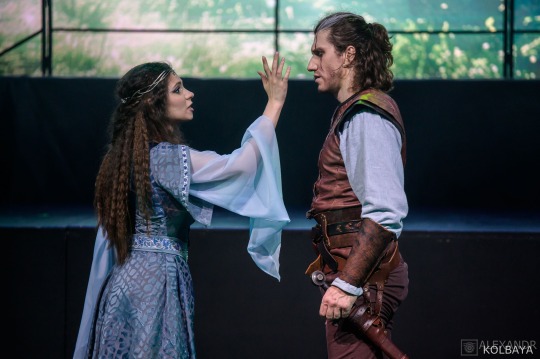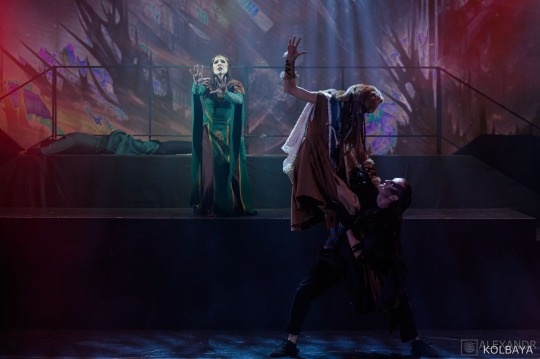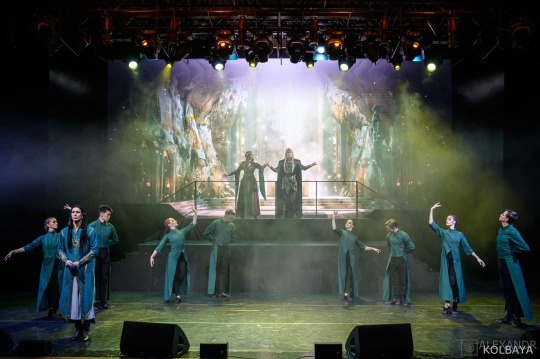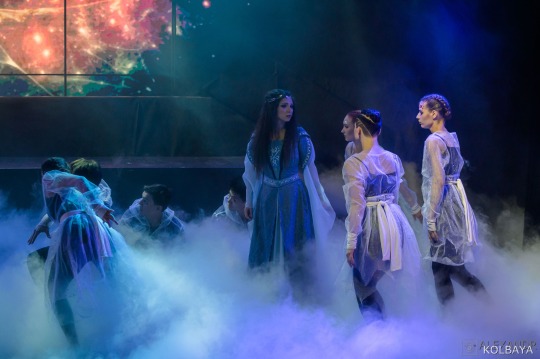#i don't think it's a rock opera anymore tbh
Explore tagged Tumblr posts
Text




Lay of Leithian: The Rock Opera
Subtitled Livestream- 9 November, 2024
Two different fates are woven together when Lúthien, an elven princess, falls in love with Beren, a hero of mortal men. To win her hand, Beren is sent on an impossible quest- to cut a legendary gem from the crown of the Dark Lord. So begins this battle between light and darkness, love and duty, in the most enduring tale of Tolkien’s Middle Earth.
Want to experience a new Tolkien adaptation? Our little Leithian fandom would like to invite you to one of our livestreams! Come join myself and some other fun Silmarillion fans as we watch this Tolkien rock opera together.
Where: Cytube (video stream) / Discord (live chat) Links will be reblogged here, 1 hour before the stream. When: Sunday, 9th November, 9am PST / 12pm EST / 18:00 CET Run Time: 1hr, 35m, with a 15 minute intermission Performance Details: June 2024 recording in 4K Language: Russian / Subtitles: English* *Subtitles are an uncorrected draft; they may contain slight timing errors or performance/script inconsistencies that should not detract from the stream. Note: This recording contains flashing lights. Additional Material: • Lay of Leithian translation • Links and resources
See you soon! 🤘
#i don't think it's a rock opera anymore tbh#it's really a musical at this point#nuance button i'm bald#ANYWAY come on by and we'll have a good time#everyone is welcome#tolkien#jrr tolkien#silmarillion#lay of leithian#beren and luthien#lay of leithian rock opera#lol the rock opera
97 notes
·
View notes
Note
hi there! i've been following you for quite a while, originally for a3, but i see you also enjoy poto. i've been meaning to get into it for a long time now, but im not sure where to start (so far, i've only ever read the book). do you have any recommendations for poto content to either start out with or to prioritize in general? thanks a ton!
Hi there anon!! this was a pleasant surprise to see in my inbox and I wasn't expecting to get questioned about POTO at all tbh! I'll try my best though 😊
I think starting with the musical would help, that's what actually lead me down the rabbit hole.
The most well known one would be Andrew Lloyd Webber's. This one is pretty similar to the book, if I recall correctly, having a some changes here and there (one of them being that the Persian isn't actually present in the musical.) I'd recommend either watching/listening to the broadway or the 2004 film, the latter being what introduced me to POTO in the first place hehe
There's also another musical by Maury Yeston and Arthur Kopit (which I've only discovered this year), though it is loosely based from the novel, and kinda shows the Phantom in a different light. I actually watched the 1990 miniseries first before listening to the musical, and I gotta say that the Phantom was very charming in this one, made me swoon a bit 🙈
Their music style is pretty different from one another, now I'm not that good with music terms and classifying the styles, but Yeston & Kopit's is more opera like compared to Webber's which is a sort of mix with opera, classical and a bit of rock maybe??? They are both bangers though, I swear.
I'm pretty sure there are other retellings and musicals based on it, but these two plus the book are the only ones I've consumed so far.
OH AND ONE MORE ACTUALLY!!
Webber actually made a sequel to his POTO musical called Love Never Dies and boY IS IT A RIDE. I think the fans have mixed feelings about it, it has great songs though omg. So so basically, it's ten years after the original musical and is set in an amusement park called Phantasma, and w/o saying anything about the plot, basically our main trio come together again and we get love triangle 2.0 with so much drama. Was honestly flabbergasted the first time I saw it ‘cause I went in blind but as I rewatched it for the 3rd time and listened to the soundtrack over and over again, I admit it's pretty good. In a trashy way. Do I recommend that you watch it? Honestly, yeah, it was a pretty wild ride and I was entertained, it was a good time despite everything about the plot. You don't have to though if you don't want to!!! Some people actually described it being fanficy or something along those line
But yeah, that's all I have to recommend, I hope this helps you somewhat!! Even though I was just rambling most of the times haha.
If you have anymore questions or if you ever do get around to getting into it more I would love to hear about it, don't be afraid to pop in with your thoughts or screaming or complaints, it would be nice to talk about it with others aside from me just ranting about it to my siblings 🤣 No pressure though!! But i genuinely hope you enjoy it 🩵🩵
Wishing you all the love, softness, and good vibes anon!! ✨🩵
#asks#anon#A poto related ask woop woop#i hope it made sense!!!#the timing of this is pretty funny considering i was considering on rereading poto for spooky season
7 notes
·
View notes
Text
KISSING YOUR VESSEL-SIZED WRINKLED BRAIN FOR THE ADDITIONAL ANALYSIS VERY GOOD VERY REAL!
Warframe has, in one way or another, been using music symbolically as a form of narration ever since TSD (though not as strongly as this update) - more than just being background music setting the mood or having a recurring leitmotif that arbitrarily plays whenever the protagonist shows up. This is What You Are, like you said, is Warframe's theme - not the Tenno's, nor the Lotus nor Arthur, or any individual character! It's a thematic symbol in itself, and can be manipulated to tell the story accordingly: other examples other than the ones already mentioned include during the Apostasy prologue where the choir became dissonant and incomplete to represent the lost Tenno, in TNW epilogue where the choir was replaced with adults to represent the maturation of the Tenno. Warframe's leitmotif "spam" is well done because it's not used arbitrarily, it's for specific moments and we begin to associate TIWYA beyond just specific characters, we can associate them with bigger ideas like themes of the story.
Considering their use of vocalisations in music to symbolise (or straight up tell, just in a very aurally obscured way) certain ideas, and how extra careful they've been with designing the soundtrack for WITW to be its own form of narration as well (especially what you mentioned about the harmonising vocals in the final scene, which personally I felt was significantly more poignant than their already emotionally touching soundtracks) it would also make complete sense that the distorted voice reflects Arthur's own mentality! At first I thought it was just so they'd be sneaky and hide the lyrics, but you're absolutely right in that it's probably also symbolic!
But also you raise another very very important point: at this point it's become very obvious that *nothing* the composers write is incidental anymore. I don't think 1999's lyrics were distorted for the sake of mimicing 90's rock alone, I think it's meant to be something for the audience to inspect. This started with TIWYA, but has obviously expanded more broadly in this update especially since most of the WITW does in fact have lyrics - Voidtongue! DE confirmed during TNW that the Voidtongue in the epilogue actually did have meaning, and it probably would also be the case for the soundtrack in WITW. I genuinely think we have to start taking into account analysing the music from here on out to not only understand but also appreciate the bigger picture of Warframe (dare I say for the sake of media literacy(TM) lol). The WITW and 1999 soundtracks are more than just accompanying scenes now - they're consistently NARRATING to us and FORESHADOWING events too!
Also related to your first tangent: A bit more recently they've also been tip-toeing around using vocalised music as an actual in-universe Void-based "force" that affects things. The Void Angel's song was known to lure the Holdfasts, Duviri Paradox was initially supposed to be based on operas (and still has characters based on masked theatre stock characters, including Luscinia who operatically soothed Thrax) before it was simplified to just representing a storybook, the Voidtongue itself used musically for WITW (even visually, with its soundwaves being shown through smoke) and Duviri Paradox. I wouldn't be surprised if music itself became more influential on a more meta level, and tbh would love to see it explored more too :'D
The 1999 combat theme and its foreshadowing because the autism got to me and I spent too long trying to figure out this soundtrack
Jumping off from @brokenjardaantech's WITW music analysis post here - go check it out, it's very insightful and lays the foundations for what I'm about to talk about! And thanks to @theterribletenno for the burst of inspiration by giving me a massive oh shit realisation in the most chilling way possible LOL
Spoilers under the read-more; TL;DR at the end :'^D
To preface, the soundtrack is structured in an ABC structure with bridges between A and B, as well as another between B and C that borrows from A. The key starts in Cm, briefly modulating to Gm in section B then back to Cm during the second bridge, and settling on Em for section C. In-game for WITW you most likely will only hear up to the first bridge since the Technocyte fight only goes for around a minute long
Sections A, the bridges and partially C feature genre similarities to grunge rock with fuzzy guitar chugging, whammy bar, and palm muting, while the drums are notably sharp snares (except for the first bridge, which are clean bass kicks that gradually distort transitioning into section B's style). Musically, it sounds like a typical fighting soundtrack meant to hype you up - the melody is confident and likes to push and pull its rhythm. But in section C it notably become emptier in its layering while keeping the distorted drums, placing emphasis on the lyrics (which I'll get to below lol). Heavier syncopation and polyrhythms are also introduced.
Section B however is the main outlier. This section is where it most strongly resembles industrial rock: rhythmic synth layers begin to accompany the melody (a pedal point line that plays every semiquaver/sixteenth note), synth drums replace acoustics and the guitars drop the fuzz that is characteristic of grunge and steadily strum every quaver/eighth note. Compared to the push and pull rhythm of section A, this section is steadier, less chaotic than the other sections, it wants you to focus on this section.
Notably, the lead guitar introduces a familiar leitmotif: This is What You Are (which @brokenjardaantech goes more in depth regarding its use in WITW). Here, though, its second chord becomes flattened (Dm -> D♭m) and introduces a diminished, dissonant sound. To me this was the first hint that the song may actually be about Arthur's downfall. This is What You Are is a musical leitmotif that recurs in moments of vulnerability, especially when someone is at risk of losing their sense of self, their identity and what they are. It plays during The Second Dream when we discover the Operator, during the New War when Eidolon!Lotus just lost herself to Ballas and can't recognise the Tenno, and in WITW during the Vessel "fight" when the Tenno is forced out of their Warframe.
I was prompted to actually dig more into the lyrics because I saw @theterribletenno bring up something really interesting

In this specific song, the leitmotif is diminished, it's corrupted. "Surrender to the corruption" - this is what Arthur is afraid of. I brought up earlier that section B had a genre shift. The contrast of the music is important, it's highlighting something, and together with the musicality of the leitmotif, it's making a sense of urgency and danger. The leitmotif is a warning to Arthur.
Section B sings these lyrics:
Break it, break it, Break it open!
Compared to the desperation in the other lines, these two lines are sung mockingly. The Infested are trying to break Arthur, and are succeeding. Their voice is becoming his. But there are actually two vocal lines in this section - you can also hear muted backing vocals in a much less aggressive and lethargic tone warning that "Disillusion". Arthur is trying so hard to keep his own voice and stay clear-minded but it's being drowned out and he's nearing his breaking point, and Albrecht, based on the Codex Fragments you find, is well aware of this.
In section C, while the layering is less intense it's noticeably more heavily syncopated and polyrhythmic, and introduces new (accompanying) echoing and dissonant synth layers reflecting the confusion and disorientation that Arthur begins to feel (these synth layers are actually introduced in the second bridge, but are more easily heard in section C). Section B and C also keep the synth/distorted drums that section A and both bridges lack (at most it's a reverb in those sections); the industrial sound of the song becoming associated with the increasing influence of the Infested over his humanity.
So I tried deciphering more lyrics for each section; I haven't figured all of it out and most of it could very well be wrong because of how heavily clipped the vocal line intentionally is so I don't want to make anymore assumptions than I need to, but I can understand enough of it to realise that the song is foreshadowing Arthur's corruption to the Infested. In green are the lyrics I'm confident are correct:
A:
Sting it, sting it, sting it! Sting it, sting it, sting it in the flesh!
Bridge:
I don't understand! It brings more disease!
B:
Break it, break it, Break it open! (Disillusion)
Bridge:
Sting it, sting it! Sting it in the flesh!
C:
Who's dreaming? Who's the [???] It's a vision[?]!
TL;DR: the grunge/industrial genre hybrid represents Arthur's humanity/Infested respectively, and the song becomes increasingly industrial as the song progresses, most noticeably through the increasing distortion of the drum sound. Section A sets the stage, section B serves as a warning to Arthur that he's losing his sense of identity as the Infestation drowns out his "voice" while a dissonant version of This is What You Are plays, and section C is him experiencing confusion and disorientation as the Infestation continues to corrupt him.
#edit: rearranfed a sentence bc im stoopid 🤡#IM NOT A MUSIC STUDENT EITHER I DID MY GRADES 5 YEARS AGO 🫠🫡🫡#warframe#warframe spoilers#I AM ASKING THE WARFRAME FANDOM TO PAY ATTENTION TO THE SOUNDTRACKS THERE ARE NO ACCIDENTS FROM HERE ON OUT
97 notes
·
View notes